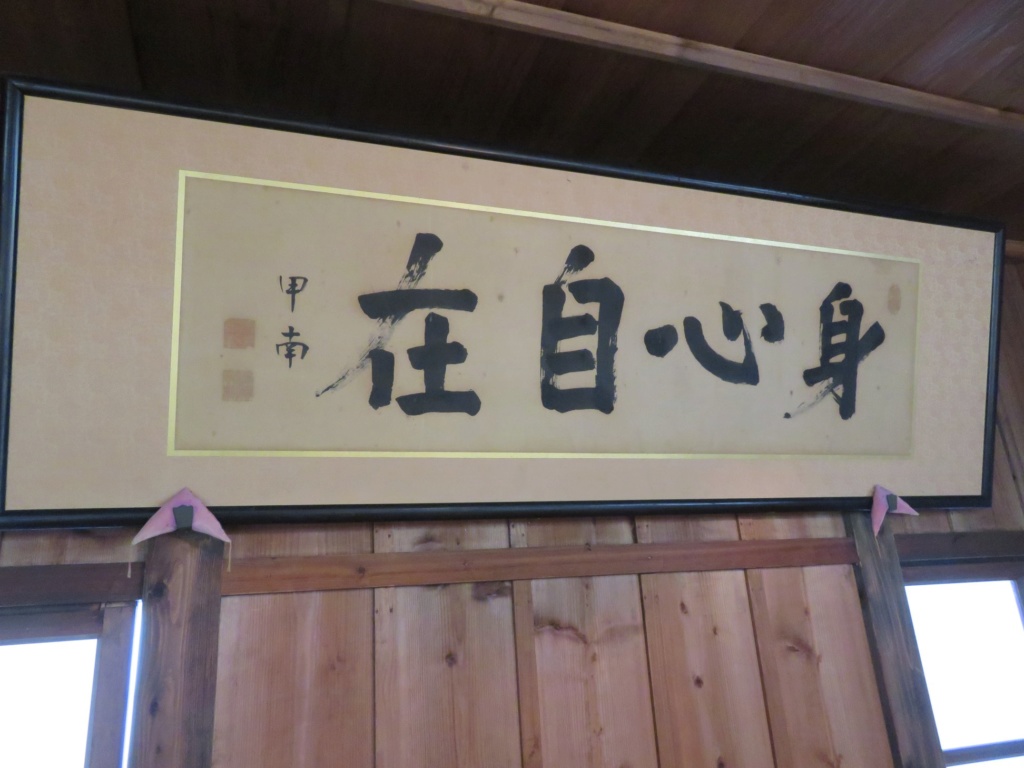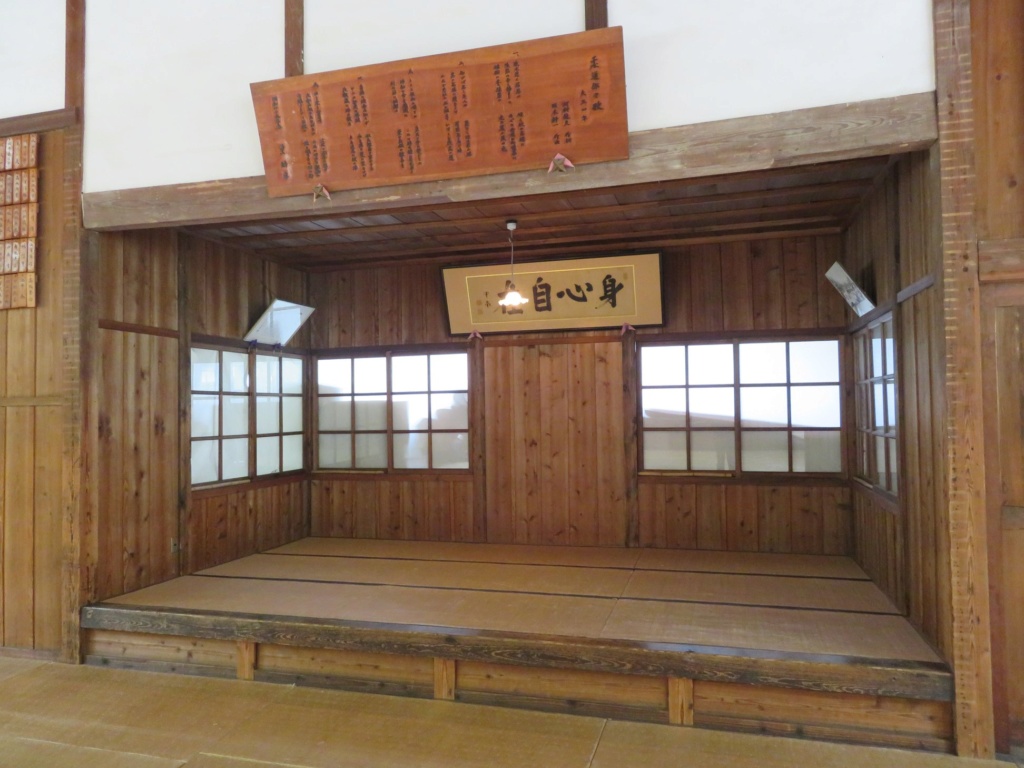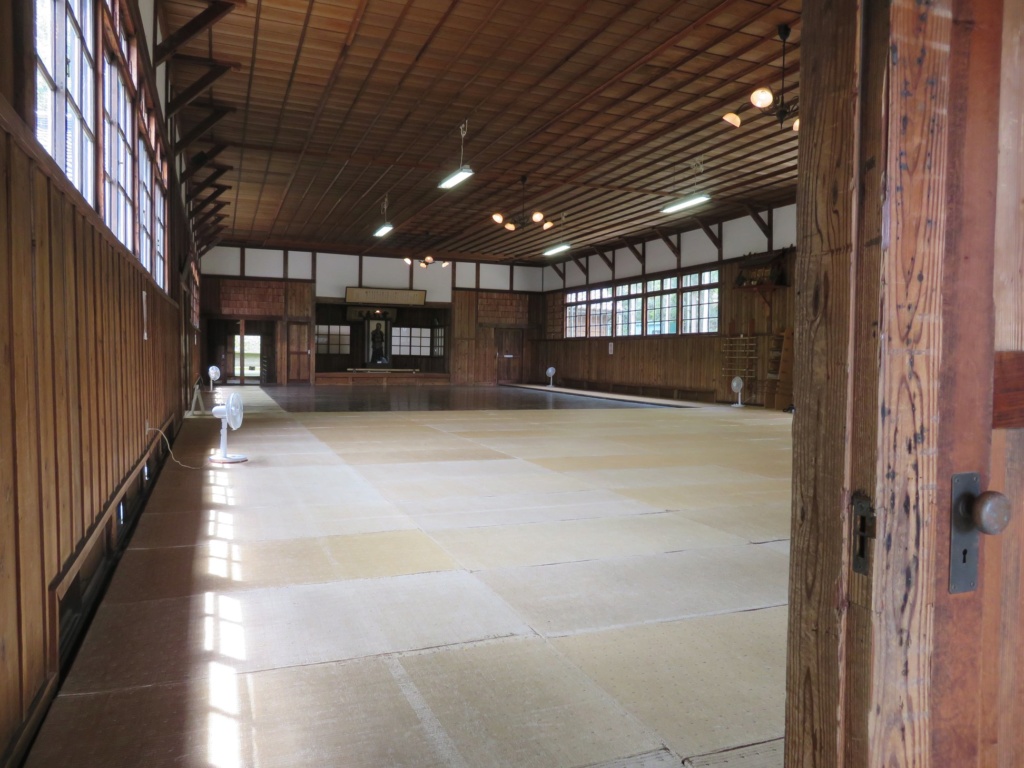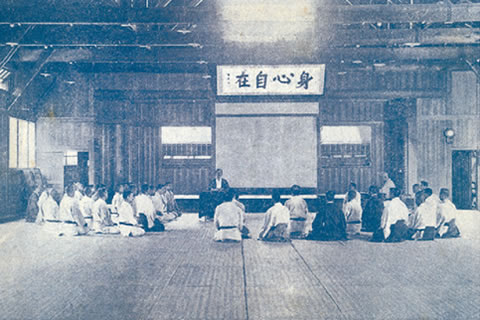http://kodokanjudoinstitute.org/en/doctrine/word/jinsei-no-koro/

“Jinsei no koro tada itsu aru nomi : There is only one journey of life”
人生行路 唯有一耳01
The Essential Point:
There is only one way on which human beings should go forward.
Even if you are standing at the very peak of success, or at the very depths of discouraging failure, there is only one way to proceed forward. At the summit of achievement, do not lose your concentration, but seek the path for the best and take it even farther forward. If you fail at some endeavor, giving in to despair or agonizing over it is a waste of energy. Remain failures as they are, and move on from that, always taking the best path available. That is Seiryoku-Zenyo.
The way on which you should proceed ahead is the one and only way that accords with the philosophy of Seiryoku-Saizen-Katsuyo.
People who undergo the discipline of Judo and are acting in accordance with this philosophy of Seiryoku-Zenyo will be able at any time to see the way on which they should keep going.
Not until you pursue the discipline of Judo by also cultivating wisdom and virtue will the magnificence of the discipline shine forth as a brilliantly bright light. As long as that light does not materialize in your actual everyday life, you cannot declare the discipline fulfilled. Regarding how it materializes in everyday life, the ways are truly complex in their diversity, but the application that is nearest to hand is in the cultivation of your very own heart and mind, which must also be in your everyday life. If there is someone among those who have practiced Judo who immoderately regrets and laments his own errors, that person cannot yet be said to have understood the deeper meaning of Judo. While recognizing one's errors is something inherently desirable, immoderately regretting and grieving over those committed in the past is of no benefit. Rather, having recognized that something was an error, one must seek not to repeat that same mistake, consider what must be done to make up for it, and strive as best as one can to do good, making every effort not to spend energy even for a moment on anything worthless.
Also, those who understand Judo are bound not to have fits of anger. Anger is a phenomenon that occurs when the emotions govern reason, causing loss of a calm state of mind. What benefit is there in being angry? In most cases it further consumes one's energy and makes others feel uncomfortable, or results in one becoming an object of ridicule. It is the same with complaining about grievances. Hardly ever does complaining about grievances bring benefit to oneself or anyone else. In most cases, you will feel unpleasant yourself and cause others also to have bad feelings, without doing any good at all. If you have the free time to be doing so, then nothing could be better than for you to accomplish the things you yourself are supposed to do, with no omissions, and eliminate the chance for complaint to reoccurring. It is also the same with agonizing over things, which will not happen to people who have successfully cultivated the spirit of Judo. Just what is there to agonize over? Agonizing is the state of mind that occurs when there are any number of avenues available and you are unsure of which to follow. The fundamental teachings of Judo say there is only one avenue for you to take. Making the most effective use of your mental and physical capabilities is the essence of Judo, meaning that if you just do what you think is best, all will be well and good. As I myself am always saying, “There is only one journey of life.” These seven words convey this meaning completely. It may be that some people will find fault with this and ask, but what should they do when they cannot tell which avenue is best? There will be cases that require you to think it through. Thinking about it, however, is different from agonizing over it. And in most cases, thinking about it is not going to require spending a very long time. This is the same as when people are traveling and come to a crossroads. If there is nobody there to ask which way to go, will the travelers just stop and spend hours or days agonizing over it? That is hardly likely to happen. The travelers are sure to give it some thought, choose the one way that seems most likely, and go in that direction. If that way turns out to be mistaken, then they will probably judge it anew and go forward in the direction they think is right. There is no need to agonize over it. All things are resolved in the very same way. I do not want those who are cultivating Judo to suffer needlessly over such a simple thing as what I have just described.
(Jigoro Kano, “Kodokan Judo no Bunkateki Seishin no Hakki” [Manifesting the Cultural Spirit of Kodokan Judo) in Yuko no Katsudo [Effective Action], Vol. 8, No. 2 (1922))
The result of research into Judo's ability to give life and to take it away was to give birth to the teaching of “Seiryoku-Saizen-Katsuyo.” This became the principle of all combat in earnest, and this principle can further be applied to everything in human life. This means that the teaching of maximum efficient utilization of the spirit, by making use of all energies, yields the greatest effect according to this principle, whether in obtaining sustenance, clothing, and shelter, or in social relations. This is why the kind of behavior that shows anger goes against this principle, even in ordinary social life. For a person to become angry is in itself a depletion of the spirit. What could there be in anger that brings benefit to anyone else or to yourself? The result of becoming angry is that you deplete your own spirit, while on the other side of it, people will dislike and despise you, and that is all it will amount to. Considering this, then according to the philosophy of Seiryoku-Saizen-Katsuyo, it would appear that people should be unable to become angry.
In addition, for a person to fail or have setbacks and so to despair and agonize over it, or to harbor grievances and dissatisfaction in themselves is also a kind of depletion of the spirit. Fighting, behaving antagonistically, all these actions go against this principle.
Judoka must take this teaching upon themselves and act with great self-restraint. No matter what situation they may face, there is only one way in which human beings should go forward. Whatever their situation at the time, they must consider what is appropriate for them to do, and proceed forward in that direction. This is the one and only way for them to take.
I have composed an expression that I regularly tell people:
There is only one journey of life.
That is the expression, and it is necessary above all to comport yourself every day according to this philosophy.
Even when human beings are poised at the very peak of success, there is only one way on which they should go forward. Even if they experience failure and discouragement, if they regain their courage and go the way they are supposed to - the best way - then all at once they will see a brilliant light on the road ahead, and they will find their circumstances gradually improving. Good ways can be found anywhere if we consider the situation. Those who undergo the discipline of Judo and devote themselves to the philosophy of Seiryoku-Saizen-Katsuyo? will find the way in which they should move forward. That is why their hearts are always at peace, and why they are joyful and positive. Only those who have thoroughly absorbed this philosophy will be able to lead the most advanced spiritual life.
(Jigoro Kano, Judo Gokui Kyohan [Innermost Teachings of Judo] (1925))












